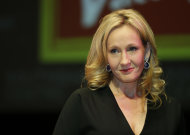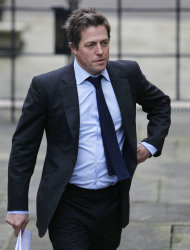

Celebrities like J.K. Rowling and Hugh
Grant accused the British government on Sunday of letting down the
victims of media intrusion and urged tough new measures to rein in
Britain's unruly press.
Lawmakers are to vote Monday on rival plans for tougher controls in the wake of the country's phone-hacking scandal.
The Conservative-led government
says it will propose a new press watchdog with the power to levy fines
of up to 1 million pounds ($1.5 million). But hacking victims say the
regulator must be backed by a new law to give it real teeth — something
Prime Minister David Cameron opposes.
"Harry Potter" author Rowling — who testified previously to a media
ethics inquiry about the impact of intrusive media upon her family —
said she and other victims felt they "have been hung out to dry" by the
government.Grant, who won damages for phone hacking by Rupert Murdoch's now-defunct News of the World tabloid, said hacking victims supported a rival plan by the Liberal Democrats and the Labour party for stronger media measures. The actor said lawmakers "promised victims to do right by them, and they have that chance on Monday."
Debate about how to control the press has raged in Britain since revelations in 2011 that tabloid journalists had eavesdropped on voicemails, bribed officials for information and hacked into computers in a relentless quest for scoops.
The scandal has brought the demise of one newspaper — Murdoch's News of the World — along with dozens of arrests and resignations, scores of lawsuits against Murdoch's media empire and a public inquiry into media ethics.
That inquiry, led by Lord Justice Brian Leveson, last year recommended the creation of a strong press watchdog body dominated by non-journalists and backed by government regulation.
But negotiations between
Cameron's Conservatives and others over how to implement those
recommendations have stalled amid an increasingly acrimonious debate.
Politicians are divided about whether a new press watchdog should be set
up through legislation — as recommended by Leveson — or through a Royal
Charter, an executive act that does not require a vote in Parliament.
Proponents say passing a law will
put the watchdog on a firmer footing and give it more power to
discipline rogue newspapers. Opponents believe that passing a media law
would endanger the country's free press.
In fact, the proposals aren't all
that different. A new law would set up an independent press watchdog,
not control the media directly. And the regulator would only have the
power to impose fines or demand published apologies from newspapers —
not to stop articles being published.
But the language of the debate
has been fierce, with opponents fearing the demise of Britain's free
press and advocates seeing a bullying media riding roughshod over
people's rights.
"The idea of a law — a great,
big, all-singing, all-dancing media law ... would have been bad for
press freedom, bad for individual freedom," Cameron said.
Rowling accused the prime minister of letting down hacking victims by ignoring Leveson's proposals.
"I believed David Cameron when he
said that he would implement Leveson's recommendations 'unless they
were bonkers,'" she said. "I did not see how he could back away, with
honor, from words so bold and unequivocal.
"Well, he has backed away, and I am one among many who feel they have been hung out to dry."

No comments:
Post a Comment